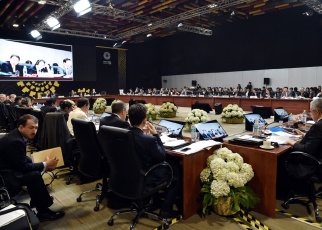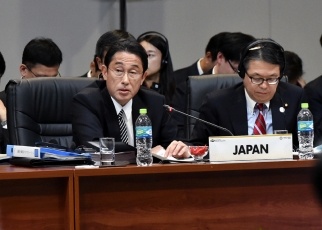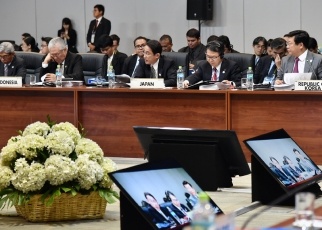Asia-Pacific Economic Cooperation (APEC)
2016APEC Ministerial Meeting in Peru
November 18, 2016



On November 17th (Thursday) and 18th (Friday) the APEC Ministerial Meeting was held in Lima, Peru, under the chairmanship of H.E. Mr. Ricardo Luna Mendoza, Minister for Foreign Affairs of the Republic of Peru, and Mr. Eduardo Ferreyros, Minister for Foreign Trade and Tourism of the Republic of Peru. Mr. Fumio Kishida, Minister for Foreign Affairs, and Mr. Hiroshige Seko, Minister of Economy, Trade and Industry attended representing Japan.
Under the overall themes of "Quality Growth and Human Development," opinions were exchanged on a wide variety of subjects during the four sessions detailed below. APEC Peru 2016 AMM (APEC Ministerial Meeting) Joint Statement (PDF) was released as an outcome of the meeting.
was released as an outcome of the meeting.
Under the overall themes of "Quality Growth and Human Development," opinions were exchanged on a wide variety of subjects during the four sessions detailed below. APEC Peru 2016 AMM (APEC Ministerial Meeting) Joint Statement (PDF)
 was released as an outcome of the meeting.
was released as an outcome of the meeting.1 Schedule of the Ministerial Meeting
| 11/17 | Morning | Session 1: Regional Economic Integration and Quality Growth |
| Afternoon | Session 2: Fostering the Regional Food Market | |
| Session 3: Toward the Modernization of Micro, Small and Medium Enterprises (MSMEs) in the Asia-Pacific Region |
||
| 11/18 | Morning | Session 4: Human Capital Development |
2 Summary of the Sessions
(1) Session 1: Regional Economic Integration and Quality Growth
A. Discussions were held on subjects such as the current state of the regional and global economies, promotion of the Free Trade Area of the Asia-Pacific (FTAAP), and policies to promote the invigoration of the service trade and service related industries.B. The following is a summary of Japan's statement.
- In response to various downside risks which the global economy is faced with and the steadily growing skepticism concerning free trade, APEC needs to show its strong commitment to free trade, and contribute to the sustainable growth and prosperity in the Asia-Pacific region. APEC needs to demonstrate its intention to realize an inclusive economy in which all people can enjoy the benefit of free trade while using all policy measures to address these risks.
- It is essential to achieve the steady progress of the Trans-Pacific Partnership (TPP) and the Regional Comprehensive Economic Partnership (RCEP), which are recognized as the "pathways" to the eventual realization of the FTAAP. In Japan, the TPP has been endorsed by the House of Representatives and deliberation in the House of Councilors is under consideration. Japan advises all TPP signatories to strive for the earliest approval of the diet.
- APEC needs to maintain a strong will and continue to build capacity to address next generation trade and investment issues, and Japan will continue to proactively contribute to this area. Digital trade brings about an enormous business opportunities for enterprises including MSMEs, and discussions should be continued while positioning digital trade as one of the next generation trade and investment issues.
- For the economic development of the Asia-Pacific region, "quality" of infrastructure considering factors such as lifecycle cost, environmental performance and safety should be pursued in addition to "quantity" of infrastructure. Japan will continue to contribute to the dissemination of quality infrastructure through various APEC initiatives such as the "APEC Peer Review and Capacity Building on Infrastructure Development and Investment" and the "APEC Guideline for Quality Electric Power Infrastructure" and so on.
(2) Session 2: Fostering the Regional Food Market
A. Discussions were held on subjects such as food security, rural-urban development for quality growth and sustainable use of water resources.B. The following is a summary of Japan's statement.
- Food security plays a key role in the achievement of high quality growth and prosperity in the region. Japan has contributed to increasing farmers' incomes and revitalizing rural areas through building food value chains and promoting innovation. These measures were also emphasized at the recent G7 Agriculture Ministers' Meeting.
- Quality infrastructure in rural areas which is resilient against natural disasters is essential. Japan intends to continue contributing to this area, including related APEC projects.
- Japan welcomes the discussion of the Climate Smart Agriculture Initiative led by the United States, and will continue to proactively provide Japan's experience to this area.
- Water resources play a critical role in agriculture. Japan and the United States co-hosted the High-Level Meeting on Marine Litter, which came up with policy and practice recommendations focused on overcoming barriers to financing waste management systems and reducing marine litter.
(3) Session 3: Toward the Modernization of Micro, Small and Medium Enterprises (MSMEs) in the Asia-Pacific Region
A. Discussions were held on subjects such as innovation for growth and the integration of MSMEs into the global value chains.B. The following is a summary of Japan's statement.
- It is critical that MSMEs are integrated into the global value chains in order to enjoy the benefits of free trade. Based on the Boracay Action Agenda to Globalize MSMEs agreed upon by the APEC Ministers Responsible for Trade last year, policies should be continued to support the oversea expansion of enterprises.
- Competitive supporting industries enhance the expansion of trade and investment, and the overall growth of the regional economy. Japan and Vietnam jointly started an initiative to upgrade the policies to foster the supporting industries this year. Japan will continue contributing to raise the standard of quality for policies cultivating the supporting industries.
- Advocacy relating to the information security risks of MSMEs is indispensable. Japan has revised its guidelines for information security management of small and medium enterprises, and anticipates the improvement of the security level in all economies.
(4) Session 4: Human Capital Development
A. Discussions were held on subjects such as education for growth and prosperity and entrepreneurship and innovation.B. The following is a summary of Japan's statement.
- Sustainable growth under the conditions of a low birth-rate and aging population is an issue that must be faced by both developed and developing economies in the near future. To overcome this challenge, Japan will strive to fulfill its initiative of "Japan's Plan for Dynamic Engagement of All Citizens," to realize the full potential of countless individuals and generate innovation as part of the second stage of Abenomics.
- "Work Style Reform" is the most critical subject to realize "Japan's Plan for Dynamic Engagement of All Citizens." Initiatives are being implemented focused around the key factors of "various and flexible work styles," "most advanced human capital development" and "labor mobility toward high-productivity industries."
- Japan will continue to support the engagement and participation of women in a variety of areas.

